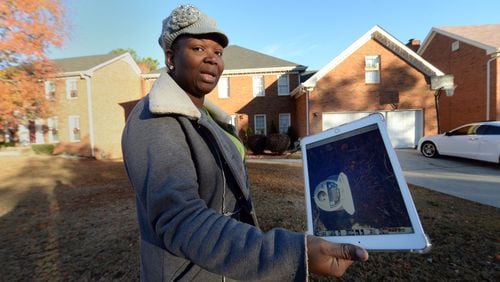Every time Rosemarie Thompson receives a water bill, she’s baffled by the $400 — or higher — charge for such a basic necessity.
Convinced the calculations are wrong, she’s called DeKalb County customer service representatives not once or twice to double check her water usage, but more than 10 times. Technicians have repeatedly examined her meter.
Still, she can't get an explanation for why the bill for her Stone Mountain home jumped from an average of $175 bimonthly to so much more. Even as she fights the charges, the amount she owes has risen to $1,600.
Thompson is among thousands of DeKalb residents who are balking at what they have deemed absurdly high charges. Homeowners have flooded customer service lines with complaints and crowded into town hall meetings.
To determine the extent of the problem, The Atlanta Journal-Constitution analyzed billing data for water and sewer services and found that sticker shock is widespread in DeKalb.
Bills for 1 in 8 customers showed spikes that were at least three times the median for that household or business, according to water billing data from April 2015 to October 2016, obtained by the AJC under Georgia's Open Records Act. That's 22,488 customers whose bills tripled — at least in the county's system.
Not all of those bills were mailed because workers sometimes discovered mistakes in them. But many incorrect bills went out.
Kevin Snow opened a giant bill — $1,941,745.81 — in August 2015.
“As you can imagine, we were quite surprised,” said Snow, who lives in Avondale Estates. “My wife promptly called. And whomever she spoke with said it was an error and not to do anything with it. It has since resolved itself.”
Mistakes are due to a variety of reasons, from malfunctioning meters to human error.
Then, there are the bills that are correct, but have skyrocketed because of leaks or normal activities like watering lawns or filling pools.
County officials have found themselves scrambling to distinguish between the two. Public meetings have been full of people protesting what they see as unfair charges.
“Now people are realizing that it’s getting crazy. What’s going on?” said Thompson, whose family lives in a two-story brick house. “I’m trying to tell the county it doesn’t make sense.”
Along with the 13 percent of accounts with bills that had tripled at least once, 1 in 4 of the accounts examined had bills that doubled, and nearly 1 in 10 was billed four times their median.
“When I compare it to my other utilities, I’ve never had a problem where it just triples,” said Star McKenzie, who started the Unbelievable DeKalb Water Bills group on Facebook, which has more than 2,100 members. “It’s eye-opening to see how many people are having problems.”
Even when they are correct, DeKalb water bills are more expensive than in most other areas.
The typical monthly bill for a DeKalb household that uses 8,000 gallons of water is $139, which is lower than Atlanta’s average of $253 but higher than Cobb, Fulton and Gwinnett counties, according to DeKalb’s 2015 annual financial report.
DeKalb increased water rates each year from 2008 to 2014 for a cumulative increase of 148 percent, in part to pay for long-delayed water and sewer infrastructure improvements. A $100 bill in 2007 now costs $248.
There's no doubt that billing inaccuracies are pervasive throughout DeKalb. To reduce billing errors, the county is testing each of its meters for accuracy, holding meter readers accountable for errors and reviewing bills before they're mailed, DeKalb Chief Operating Officer Zach Williams said.
Any bill that triples or more from the previous billing cycle is flagged by the county’s computer system and evaluated.
“DeKalb County intends to get this right and regain the public’s confidence,” Williams said. “We’ve gone about a process of systematically identifying the underlying issues, so we’re not simply addressing symptoms, but root causes.”
He said he hopes to eliminate most of the billing errors within six months.
It’s hard to tell how often water bills are disputed in Georgia, or around the nation. But DeKalb’s number of elevated bills appears to be abnormal, said David Springe, executive director for the Maryland-based National Association of State Utility Consumer Advocates.
“My gut says it seems a little bit high,” he said.
Billing hiccups as extreme as Snow’s are not altogether uncommon. In the AJC’s analysis of billing data, the county initially billed 95 customers more than $1 million each. Their water consumption was listed at nearly 100 million gallons in a single billing cycle.
The county says workers fortunately caught almost all of those erroneous charges before residents saw them on bills.
Craig Kirkland was one of the residents spared. He said he never received his $1 million-plus bill.
“If they want $1.94 million from me, by God they’re going to have to come and draw blood,” Kirkland said. “That’s funny.”
About 9 percent of customers in the 19-month period examined by the AJC had at least one bill higher than $500, though that figure includes large businesses as well as residences.
Mattie Robinson’s bill for her Decatur home wasn’t quite that high. But it was high enough. It jumped from $79 in September to $219 in October.
“It seems like they can’t get the problem solved,” said Robinson.
AJC data specialist Jeff Ernsthausen contributed to this report.
Monthly water billing rates
Arlington County, Va.: $106
Austin Water Utility, Texas: $126
Atlanta: $253
Cobb County: $78
DeKalb County: $139
Fulton County: $67
Gwinnett County: $111
Hall County: $156
Note: Rate comparison is based on 8,000 gallons of usage per month.
Source: DeKalb County 2015 Comprehensive Annual Financial Report
How we got the story
DeKalb County residents have been protesting high water and sewer bills for months, saying the charges are inexplicable. In some cases, bills have have jumped to $1,000 or more.
They’ve demanded answers from DeKalb’s government officials, who say some of the bills are correct and some aren’t. It will take time to correct some of the mistakes. Workers need to replace malfunctioning water meters, reduce billing errors and walk residents through the dispute process.
The Atlanta Journal-Constitution used Georgia’s Open Records Act to request water and sewer billing amounts, usage and payments for every DeKalb water customer from April 2015 to October 2016.
After receiving a giant spreadsheet with the billing data, the AJC filtered billing amounts to include only customers with more than eight bills and to eliminate negative bills, which indicate refunds rather than charges.
The data showed that 13 percent of customers had at least one bill that was more than triple their median bill. It also found 95 accounts erroneously charged more than $1 million.
How to dispute your water bill
1. Call DeKalb County's customer support line at 404-371-3000, email dekalbwaterbillingfn@dekalbcountyga.gov or visit the Utility Customer Operations Center at 774 Jordan Lane, Suite 200 in Decatur.
2. Ask to dispute your bill. Once your account is in the dispute resolution process, you'll be required to pay your previous average bill amount while the county investigates the issue.
3. Your water service won’t be disconnected as long as you pay the average bill amount.
4. A field technician will be dispatched to investigate your water meter. Residents can question technicians if they desire.
5. The county will review the technician’s findings and contact the customer to adjust the bill, if necessary. Customers are responsible for paying the full cost of their actual water usage.









